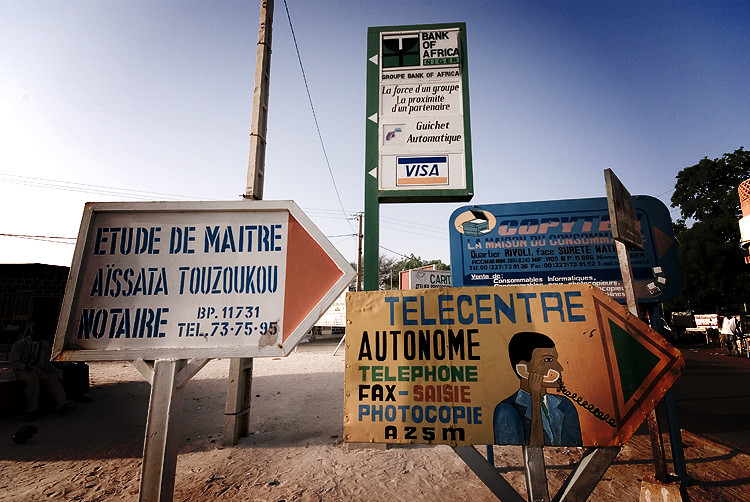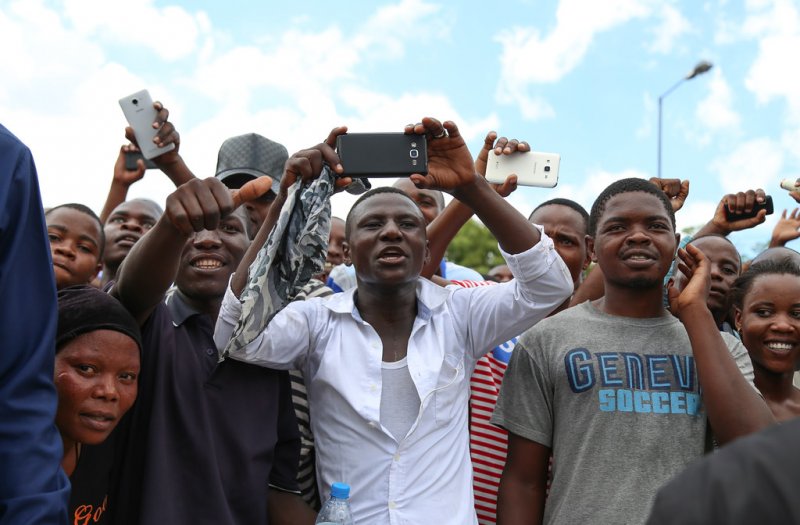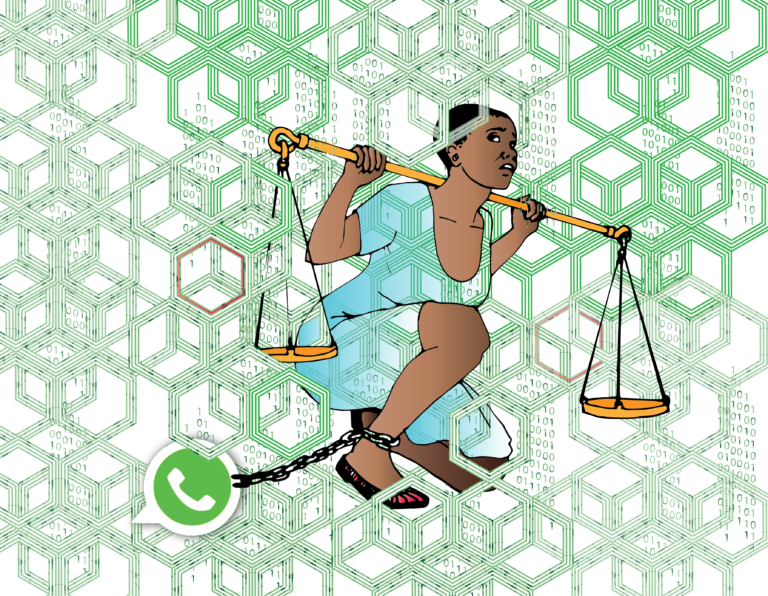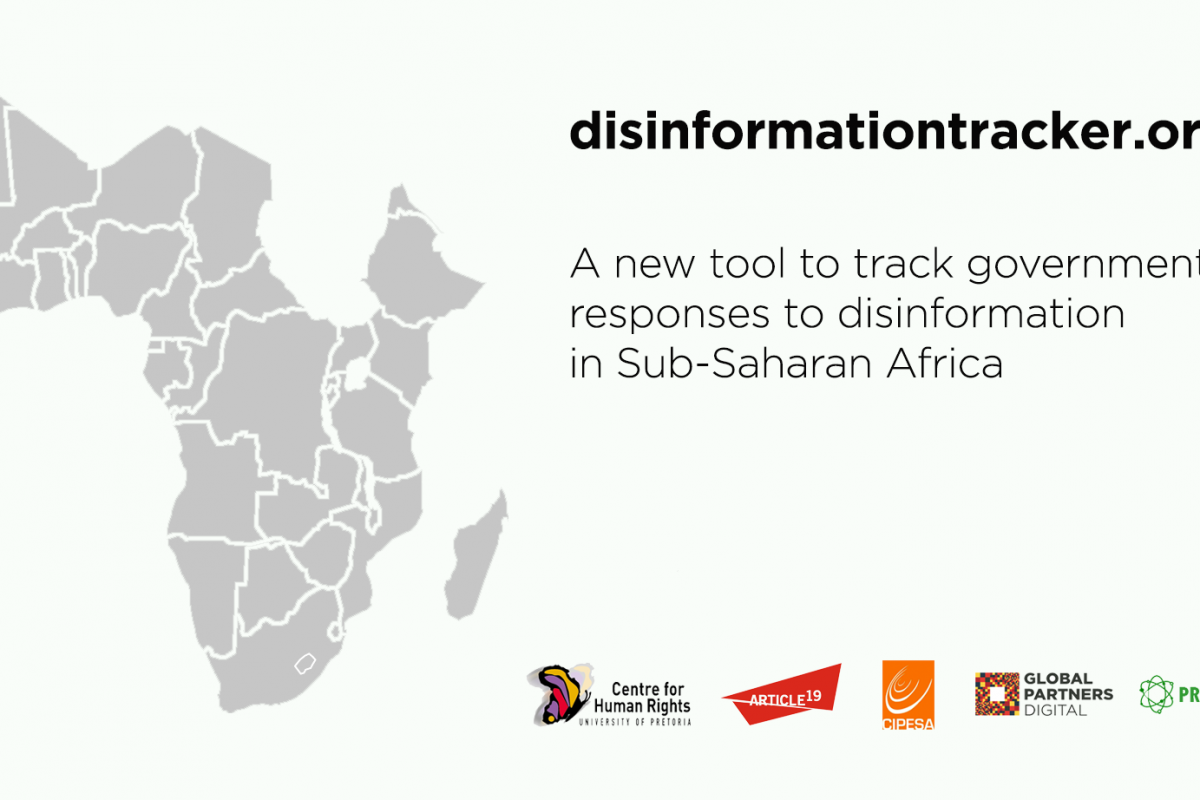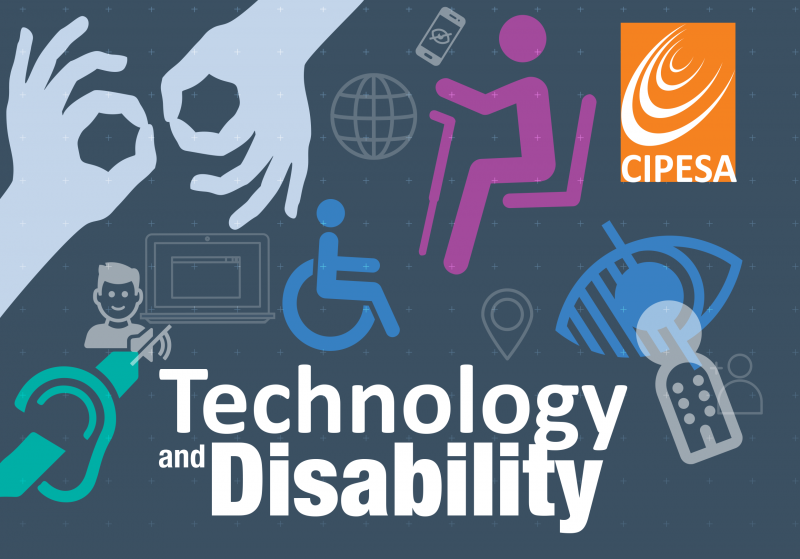Par Simone Toussi et Thomas Robertson |
Face aux problèmes de la sécurité nationale liée au terrorisme, au conflit ethnique, et au crime organisée, le Niger a promulgué une nouvelle loi sur l’interception des communications électroniques, avec des ramifications qui menacent la liberté d’expression et le droit à la vie privée en ligne.
En avril 2020, le Conseil des Ministres nigérien a déposé un projet de loi visant à sécuriser une base légitime pour «les interceptions des communications émises par voie électronique en vue de la recherche des renseignements intéressant la sécurité nationale» (Exposé de Motifs). Le 29 mai, l’Assemblé nationale a adopté à l’unanimité le projet de loi, alors que l’opposition politique a boycotté le vote, arguant que cette loi autorise la surveillance généralisée de communication «sous de fallacieux prétextes, autres que ceux relatifs à la sécurité et la lutte antiterroriste.» Malgré le boycott, le projet de loi est devenu loi en vertu de l’article 58 de la constitution nigérienne, qui spécifie que si un projet de loi reçoit le vote de la majorité absolue à l’Assemblé nationale, il est promulgué immédiatement sauf dans le cas d’un veto présidentiel, ce qui n’a pas eu lieu.
Contexte de sécurité régionale
Le Niger fait partie de la région sahélienne d’Afrique de l’ouest, où les programmes de lutte contre le terrorisme malavisés ont disproportionnellement conduit à la stigmatisation sociale et la violence contre les communautés marginalisées peules. Depuis le début de 2020, plus de 150 personnes, principalement les hommes peuls, ont disparus ou ont été victimes des exécutions extrajudiciaires par les forces de sécurité nigériennes. Le Burkina Faso voisin a été dénoncé aussi pour la cruauté avec laquelle les milices de l’État ont travaillé aux régions peuls, dont l’exécution extrajudiciaire de 12 hommes et l’enquête subséquente que les acteurs de la société civile ont largement critiqué. Bien que le Burkina Faso ne soit pas engagé à l’interception de communication, une loi de 2019 punit les organes de presse qui critiquent les forces de défense burkinabés. Pendant ce temps, le Mali qui partage également une frontière avec Niger, a adopté une loi sur la cybercriminalité en 2019 qui prévoit la surveillance en temps réel par l’interception des communications. Cette loi nouvelle, qui donne l’accès gouvernemental aux données de communication numérique, peut encore aggraver la violence injustifiée actuelle de l’État contre les communautés ethniques à travers le Sahel.
L’autoritarisme numérique
La nouvelle loi entre en vigueur dans le contexte d’un cadre réglementaire qui déjà empiète sur la liberté d’expression des citoyens nigériens. La loi du pays sur la cybercriminalité adoptée en juin 2019 criminalise «le fait pour une personne de produire, de mettre à la disposition d’autrui ou de diffuser des données de nature à troubler l’ordre public ou à porter atteinte à la dignité humaine par le biais d’un système d’information» (Article 31). Cet article était la base d’une répression sur la liberté d’expression en ligne, dont l’arrestation d’une dizaine d’activistes entre mars et avril 2020 après que l’Etat ait intercepté leurs communications critiquant le gouvernement sur WhatsApp et Facebook. En 2016, un militant a été condamné de «complot visant à renverser le pouvoir» après avoir utilisé Facebook pour critiquer l’action antiterroriste du président nigérien Mahamadou Issoufou.
La loi sur l’interception des communications électroniques tente «de concilier l’exercice de cette liberté [d’accéder à l’information] avec les impératifs de sécurité nationale dans un contexte de lutte contre le terrorisme et la criminalité organisée » (Exposé de Motifs). Elle viole cependant les principes démocratiques en accordant des pouvoirs considérables à l’exécutif du gouvernement. En vertu de l’article 2, seuls le Président, le Premier Ministre, le Ministre de la Défense, le Ministre de l’Intérieur, le Ministre de la Justice, et le Ministre des Douanes sont autorisés de commander une interception de communication. Par ailleurs, selon l’article 6, la commission crée pour superviser l’exécution de la loi – la Commission Nationale de Contrôle des Interceptions de Sécurité (CNCIS) – est composée de sept représentants du gouvernement, à tous ceux qui ont désigné par les membres du cabinet présidentiel.
Selon l’Union international des télécommunications, le taux de pénétration d’internet du Niger était 5,25% en 2018. Ce taux compte parmi les plus faibles au monde, et en Afrique où l’accès à l’Internet n’est plus faible qu’au Burundi, en République Centrafricaine, en Erythrée, en Guinée-Bissau et en Somalie.
Sur le plan de la liberté de la presse, le Niger est dans une situation grave avec la répression actuelle sur la dissidence. En effet, malgré les dispositions législatives en faveur de la liberté des médias sous la loi portant liberté de la presse (Ordonnance 2010-35), le Niger a des antécédents défavorables quant au traitement des médias indépendants comme souligné ci-dessus concernant l’exécution de l’article 31 de la loi sur la cybercriminalité. L’arrestation des journalistes sur des accusations motivées par des considérations politiques est banal, et le COVID-19 a aussi contribué à l’application de la loi contre les journalistes. Par exemple, en mars 2020, Mamane Kaka Touda a été arrêté et détenu pour trois semaines à cause de ses publications sur les réseaux sociaux au sujet d’un cas suspect de COVID-19 dans un hôpital nigérien.
En outre, le rang du Niger sur l’indice de développement humain 2018 a été 189ème sur les 189 pays examinés. Ces indicateurs amènent à se demander pourquoi le gouvernement nigérien se concentre sur la surveillance numérique alors que l’accès à l’Internet est déjà disparate, et que des problèmes de développement socioéconomique plus immédiats menacent le peuple nigérien.
Avec les élections présidentielles imminentes fixée pour décembre 2020, en réalité, l’adoption des lois restrictives liées à l’usage de la technologie par le citoyen suit une logique particulière aux gouvernements autoritaires africains selon un rapport de 2019 sur les dimensions techno-politiques des interruptions d’Internet en Afrique.
La vie privée menacée
La loi sur l’interception des communications électroniques dans son ensemble viole l’article 29 de la constitution nigérienne, qui assure le secret des correspondances et des communications. L’article 2 circonscrit les contours de l’interception: «atteinte à la sûreté de l’Etat et à l’unité nationale, atteinte à la défense nationale et à l’intégrité territoriale, prévention et lutte contre le terrorisme et la criminalité transnationale organisée, et prévention de toute forme d’ingérence étrangère et intelligence avec l’ennemi.» Comme les caractéristiques spécifiques et la nature des communications entrant dans ces grandes catégories ne sont pas définies, cet article peut exposer les citoyens nigériens à la surveillance permanente. De plus, les articles 24, 32, et 33 exigent aux agents publics, aux operateurs de reseaux et aux fournisseurs de services de coopérer avec les opérations d’interception, dont la défaillance entraînerait l’emprisonnement pour une durée d’un à cinq ans et une amende de deux à dix million francs CFA (USD 3 445 à 17 222).
Bien que la loi prévoit en apparence une surveillance indépendante, l’opération d’interception est susceptible de porter atteinte à la vie privée. L’article 11 spécifie que les enregistrements liés à l’interception sont détruits sur l’ordre du président et expirent un mois après que l’ordre d’intercepter les communications soit donné, et les rapports d’enquête sur l’exploitation de l’interception rédigés. L’article 12 peut cependant permettre la sauvegarde prolongée des enregistrements de l’interception pour une durée indéterminée, spécifiant que «les transcriptions d’interceptions doivent être détruites dès que leur conservation n’est plus indispensable à la réalisation des fins mentionnés à l’article 2 [atteinte à la sûreté d’Etat, etc.]» et «il est dressé procès-verbal de l’opération de destruction.»
Avec cette nouvelle loi et la loi sur la cybercriminalité, le Niger rejoint la horde des pays africains dont le Cameroun, le Tchad, le Nigéria et la Tanzanie qui utilise la sécurité nationale comme prétexte pour introduire les législations qui limitent la liberté d’expression et d’opinion, le droit à la vie privée et bien d’autres libertés civiles. L’ancienne maltraitance des voix critiques par l’Etat justifie les réserves sur son objectif apparent de combattre l’activité criminelle et le terrorisme. Si la loi est maintenue, l’on peut s’attendre à plus de violations et d’arrestations contre les voix dissidentes, du moment où le Niger se prépare pour les élections présidentielles en décembre prochain.
Tanzania Entrenches Digital Rights Repression Amidst Covid-19 Denialism and a Looming Election
By Edrine Wanyama |
On July 17, 2020, the Tanzania government issued new Electronic and Postal Communications (Online Content) Regulations, 2020 that apply to online content production, hosting and dissemination. The regulations entrench the licencing and taxation of bloggers, online discussion forums, radio and television webcasters, and repress online speech, privacy and access to information.
The passage of the new regulations raises concerns over free speech and access to information as they come into force barely three months before Tanzania holds presidential elections on October 28, 2020, a period when civic engagement and transparency and accountability in governance requires access to a range of information and viewpoints. The regulations also come amidst Covid-19 denialism by President Pombe Magufuli’s government, which has denied citizens access to vital information and undermined efforts to contain the spread of the virus in the east African country.
Tanzania has been widely criticised for its lacklustre response to the Covid-19 pandemic, yet the regulations aim to further stifle access to health information by prohibiting the publication of “content with information with regards to the outbreak of a deadly or contagious disease in the country or elsewhere without the approval of the respective authorities.”
Earlier this year, the communications regulator, Tanzania Communications Regulatory Authority (TCRA), banned the independent Mwananchi newspaper from publishing online for six months, after accusing it of carrying a false and misleading news report on Covid-19. At the time, TCRA said the publisher had flouted the much-criticised Electronic and Postal Communications (EPOCA) (Online Content) Regulations, 2018, which have been replaced by the new regulations. On July 9, 2020, the TCRA suspended the independent Kwanza Online TV for 11 months, over a report on its Instagram account that cited a health alert issued by the United States embassy in Tanzania, on the Covid-19 situation in the country.
In July 2020, United Nations experts noted that Covid-19 had compounded pre-existing human rights concerns in Tanzania, notably regarding the right to freedom of expression, including freedom to seek, receive and impart information. They added that Tanzania’s government was not meeting its commitments on information sharing and transparency after it stopped releasing statistics on Covid-19 cases at the end of April, and President Magufuli declared the country virus-free in early June.
The new regulations require online content service providers, internet service providers, and application services licensees to pay exorbitant fees for licensing and renewal of licences. Providers of “online content service”, described as “content broadcasting to the public through internet websites, application software, forums, blogs, weblogs, microblogs, public account, instant messaging tools, online live streaming, aggregators and other related platforms”, pay an application fee of Tanzania Shillings (TZS) 100,000 (USD 44); initial licence fee of USD 440 or USD 220; annual licence fee of USD 440 or USD 220; and a licence renewal fee of USD 440 or USD 220. The higher fees are to be paid by providers of “news and current affairs”; the lower ones by providers of entertainment, educational or religious content.
Radio and television operators that stream content online will pay USD 22 in application fees, USD 88 for the initial license, another USD 88 in annual licence fees, and USD 88 in licence renewal fees. The duration of all licences is three years.
Similar measures have previously been adopted to gag online content providers including broadcasters and bloggers during elections as was in the Broadcasting Services (Content) (The Political Party Elections Broadcasts) Code 2015.
The new regulations introduce a problematic definition of “news related content”, namely “online news information gathering, compiling, editing, publication and broadcasting in a manner similar or that bears a resemblance to traditional media services provision.” This essentially covers all information provided online. Similarly, the definition of an “online forum” has been expanded compared to that in the 2018 regulations, to cover every possible online fora and “online platforms”. These definitions are so vague that their application is potentially boundless in scope. With the past experiences of crackdown on media houses and journalists in Tanzania, these definitions appear to be calculated to target individuals and organisations such as Jamii Forums that champion free expression.
The new regulations raise the requirements for applicants, as well as the obligations of licensees, which could have a chilling effect on digital rights. Under regulation 6(2), applicants must provide certified copies of the certificate of registration, tax identification number, tax clearance certificate (for companies or non-government organisations) and national identity card. Furthermore, the applicant must provide a list of owners and the management team, editorial guidelines (if applying to provide “news and current affairs”) and technical description of facilities to be used. Moreover, under regulation 6(i), the TCRA may require additional documents.
The regulations expand the obligations of online content service providers and, under regulation 9(g), require licensees to remove prohibited content immediately upon being ordered by TCRA. This does not provide room for verification or the right to be heard before removal is effected. Further regulation 9(h) and regulation 14 hold the licensee accountable for all information published. This imposes a heavy burden on licensees, including bloggers with no journalistic skills or resources to verify all information before publication, which curtails freedom of expression and denies citizens access to a variety of information. Moreover, for some unexplained reason, regulation 10 bars radio and television stations that hold district or regional license from live streaming content.
Some provisions potentially violate the right to privacy and undermine free expression. The requirement to install cameras in internet cafes and to store images recorded for 12 months has been retained under regulation 13. Further, the requirement to assign static public Internet Protocol (IP) addresses to computers in cafes would discourage usage of circumvention tools, such as Virtual Private Networks (VPN), which enable users to bypass network restrictions and to enhance their anonymity.
Furthermore, regulation 6 in as far it requires attachment of a tax identification number certificate, national identity card of the applicant and curriculum vitae, as well as academic qualifications of staff in regulation 12 (b), exposes private data. In the absence of a law on data protection and privacy in Tanzania, there is no guarantee that individuals’ data will be safeguarded against unauthorised access and disclosure.
The new regulations expand the list of prohibited content to a wide and ambiguous scope that fails to meet the internationally acceptable limitations to freedom of expression. For instance, while para.2 of the Third Schedule protects personal privacy and human dignity, it renders a publisher liable for slander and defamation even where the published information is true. This ignores the widely acceptable defence of truth to defamation. Moreover, it is increasingly recommended globally that defamation should be decriminalised.
Furthermore, para.3 prohibits publication of information on public security, violence and national security, including undefined “news, statements or rumors for the purpose of ridicule, abuse or harming the reputation, prestige or status of Tanzania or its national anthem, symbols and logos.” This prohibition is contrary to freedom of expression guarantees provided for under article 8 of the Constitution of Tanzania. The prohibition of publication of information on demonstrations and marches potentially inhibits freedom of assembly and association, which are also guaranteed by article 20 Tanzania’s Constitution.
Failure by the regulations to clearly define prohibited information, such as that considered a threat to national security or public order in paras. 3(d) and (h), to the national currency or the national economy in para.3(f), or information relating to terrorist attacks, droughts, weather forecasts or occurrence of natural calamities para.8(b), could be used by advantaged authorities to wantonly punish critics of government and its leaders.
Regulation 21 introduces a general penalty for breaching the regulations where no specific punishment has been prescribed: a fine of not less than USD 2,200 or imprisonment for a term of not less than 12 months, or both.
In their current state the regulations will further narrow the already shrinking space for digital rights and freedoms in Tanzania, as they will muzzle freedom of expression, access to information, and individual privacy. Such freedoms are particularly important in times of elections and a pandemic. The government should therefore consider repealing or amending the EPOCA (Online Content) Regulations, 2020 so that they progressively promote the enjoyment of digital rights and freedoms.
Countering Nonconsensual Sharing of Intimate Images: How far do Uganda’s Laws Go?
By African Feminism |
In 2014, when Uganda introduced a law against pornography, few anticipated that it would largely be used to target and prosecute women, and specifically women whose intimate photos have been shared online without their consent. The Anti-Pornography Act, whose enforcement is spearheaded by a 9-member Pornography Control Committee is mandated to “apprehend and prosecute perpetrators of pornography, collect and destroy any pornographic materials and detect the sharing of nude materials on computers, phones and television.”
Pornography, according to the Act is “any representation through publication, exhibition, cinematography, indecent show, information technology or by whatever means, of a person engaged in real or stimulated explicit sexual activities or any representation of the sexual parts of a person for primarily sexual excitement.” The Act makes it a crime to produce, traffic in, publish, broadcast, import, export, sell or abet any form of pornography, and anyone found guilty of the offence faces a 10-year jail term.
It is on these grounds that over the years in Uganda, particularly women whose private images have been leaked on the internet without their consent have been arrested by police and tasked to explain how their photos ended up on the internet.
In 2018, a university student was arrested, charged in court and sent to prison for allegedly producing and broadcasting a pornographic video contrary to section 13(1) and (2) of the Anti-Pornography law.
In another famous case, Desire Luzinda, a renowned artiste was forced to make a public apology after the Minister of Ethics and Integrity issued threats to arrest her for engaging in pornography following leakage of her intimate photos on social media by an ex-boyfriend.
The sharing of private nude images, often by jilted lovers and hackers is used as a tool to shame women, blackmail them or extort money from them. Lindsey Kukunda, who runs the online platform Not Your Body, says it is worrying that the law focuses on punishing victims whose images have been leaked rather than the perpetrators of the crime.
“When it comes to non-consensual sharing of intimate images, the law has manipulated the situation so that women can be punished for being women. They don’t try to look for the men. It is always the women that they target,” Kukunda says.
She adds that in many of the documented cases, the photos are leaked to blackmail or extort money from the victims and had nothing to do with pornography. “The aim is often to cause distress and pain to the victims but the police make no effort to look for the blackmailer. It is easier for them to go for the woman than to carry out investigations and find the culprits who have leaked the images,” she adds.
With a focus on victims and many perpetrators getting away with their actions, this specific kind of online violence against women has been a growing trend in Uganda.

Gendered Impact Of The Anti-Pornography Law
A recently released research study by the Collaboration on International ICT Policy for East and Southern Africa (CIPESA), looked at online safety for women. The findings show that despite having a lesser presence on the internet, more women are likely to face various forms of online violence compared to their male counterparts, further undermining their participation in online spaces.
Figures from the Uganda Communications Commission (UCC) show that internet penetration currently stands at 38 per cent among the general population. In another study, the Web Foundation found that only 21 per cent of women compared to 61 per cent of men had accessed the internet in the six months prior to conducting the survey. Education and income levels played an important factor in women’s internet access, where women with some secondary school education are six times more likely to be online than those with primary and no education.
The CIPESA study under the Women At Web project involved interviews with university students, journalists, bloggers, activists, human rights defenders and business owners.
“The absence of laws designed to specifically address the various forms of digital violence such as ‘revenge pornography’, trolling and threats, and the lack of sufficient in-country reporting mechanisms exacerbate these challenges and often result in many women being forced to go offline or resorting to self-censorship,” the study reveals.
Ophelia Kemigisha, a human rights lawyer at Chapter Four Uganda, says what enforcers of the anti-pornography law are doing is simply policing women’s bodies. She says that the violence often meted against women online, as it is offline, has not been taken seriously. Instead, like violence offline, it is usually depicted as a simple misunderstanding between two parties.
“Unless we start to see non-consensual sharing of images of women as violence, we shall continue to see women victims being targeted instead of the perpetrators.”
The vagueness of the law further complicates its implementation. Recourse for Ugandan women, according to Kemigisha could be in the Sexual Offences Bill 2019, which is currently before Parliament. In the proposed law, it would be criminal for a person to send or transmit materials of a sexual nature, with violations attracting a fine or prison term of seven years or both.
By making it a sexual offence, victims would also be able to anonymously report cases without fear of being identified, something that is not possible under the current laws. Legislator Anna Adeke agrees. Cyber violence, she says, has a big gender aspect to it and so the laws must be sensitive as regards to gender because we all suffer differently on cyber platforms.
“Knowing that the media which occupies most of the cyberspace is a very patriarchal arm, it’s important that laws are gender appropriate so that we make it increasingly risky for people to abuse women online,” says Adeke.
Peace Oliver Amuge, from Women of Uganda Network (WOUGNET), an organisation that supports women’s use of Information and Communication Technologies (ICTs) says based on years of research on technology-related violence against women, for victims, one of the biggest challenges is the mechanism of where to report cases as the Police is often not competent enough to deal with cases.
Jimmy Haguma, the head of cybercrimes unit at the Uganda Police acknowledges that law enforcement officers are not well trained at investigating cases of digital crimes, especially those involving non-consensual sharing of private images.
“One of our biggest challenges in addressing online violence against women is where they can report cases to. The typical police station is not equipped with that. We are trying to devise online methods where people can report cases.”
Apprehending perpetrators, according to Haguma, has also been complicated by the fact cyber-related crimes against women, including the non-consensual sharing of their images, are often carried out by people using stolen phones.
“They use stolen phones to send text messages to their victims to send money through mobile money so that they don’t publish their images. If a person doesn’t make a call, then tracking such a person then becomes difficult,” he said.
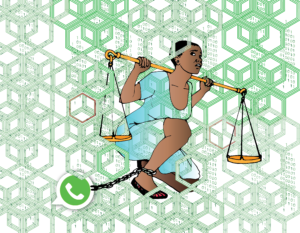
New Initiatives Closing The Response Gaps
Without adequate avenues for victims to report cases, innovative platforms such as the Women At Web Portal that is currently under development hopes to fill the void and make it easy for women victims to report cases of violations online and safely. The portal is being spearheaded under the Women at Web project, an alliance of five organisations, including Chapter Four Uganda, the Collaboration on International ICT Policy for East and Southern Africa (CIPESA), the Defenders Protection Initiative (DPI), Not Your Body and Unwanted Witness. The alliance is working to improve digital literacy and security among African women in Kenya, Tanzania, Rwanda and Uganda.
Brian Byaruhanga from the Defenders Protection Initiative, which is spearheading the development of the portal says the intention is to be able to acquire evidence based on the violations that women are experiencing online, and also make it easy for victims to report cases anonymously and safely.
“The portal will help us in policy advocacy and improve the protection of women online. As it stands now, there is no proper documentation of these cases and yet for advocacy, you need the data,” says Byaruhanga.
The portal will also be used to generate information on the types of violations, where and how they are happening and which categories of women are most targeted. This data, according to Byaruhanga will subsequently be shared with law enforcement agencies such as the Police, to ease their investigations and therefore help victims hold perpetrators to account.
Kukunda from Not Your Body says women need to take lead in challenging social conventions for their own sake. “ Women have to rise above the illusion that being sexual is a sign of immorality. It is one of the reasons they feel ashamed to report even to their friends,” adding that public conversations about these issues is what will help improve awareness and acceptance of women as sexual beings not to be demonised for it.
Support is also paramount. While there are organisations that offer free legal advice to those who cannot afford lawyers, Kukunda says women need to take the initiative to study laws such as the Data Protection Act so they can take action into their own hands.
“Women should never go alone to report a case to a police station or be naive about the system. The system is not ready to help women, nor is it interested,” Kukunda adds.
In Malawi and Uganda, non-consensual sharing of private images has yet to be widely recognized and/or acknowledged as a gendered issue. Consequently, it remains below the radar of most activists and prominent gender advocates. Globally, however, there is growing recognition that digital technology such as email, the social media platforms and mobile phone technologies are being used as a tool to harass, intimidate, humiliate, coerce and blackmail.
This article was first published by the African Feminism on June 18, 2020.
Coalition of Civil Society Groups Launches Tool to Track Responses to Disinformation in Sub Saharan Africa
Press Release |
Today, Global Partners Digital (GPD), ARTICLE 19, the Collaboration on International ICT Policy for East and Southern Africa (CIPESA), PROTEGE QV and the Centre for Human Rights of the University of Pretoria jointly launched an interactive map to track and analyse disinformation laws, policies and patterns of enforcement across Sub-Saharan Africa.
The map offers a birds-eye view of trends in state responses to disinformation across the region, as well as in-depth analysis of the state of play in individual countries, using a bespoke framework to assess whether laws, policies and other state responses are human rights-respecting.
Developed against a backdrop of rapidly accelerating state action on COVID-19 related disinformation, the map is an open, iterative product. At the time of launch, it covers 31 countries (see below for the full list), with an aim to expand this in the coming months. All data, analysis and insight on the map has been generated by groups and actors based in Africa.
Countries currently covered by the map: Benin, Botswana, Burkina Faso, Cameroon, Côte d’Ivoire, Democratic Republic of the Congo, Eswatini, Ethiopia, Gambia, Ghana, Guinea, Kenya, Lesotho, Liberia, Madagascar, Malawi, Mali, Mauritius, Mozambique, Namibia, Niger, Rwanda, Senegal, Seychelles, Sierra Leone, South Africa, Tanzania, Togo, Uganda, Zambia and Zimbabwe.
For further details, contact [email protected]
Quotes from groups:
Commenting on the launch, Article19 said: “Disinformation constitutes a major threat to the freedom of expression and the right to access information and it is geared to mislead the population and influence their opinions and views. The fight against disinformation requires a multifaceted approach ranging from education, awareness raising, proactive disclosure of public interest information, fact checking; independent regulation and effective self-regulation by legacy media and social media platforms among others. With the COVID19 pandemic, it is more important than ever that collective efforts are made to curb the impact of disinformation on public health and the rights of the public to know.”
“National legislation and policies aimed at countering and responding to disinformation should always strike the right balance between the need to protect people against this practice and the respect of human rights especially freedom of expression. Such measures should not be used to interfere or block divergent opinions and dissident voices. We are pleased to have been part of this joint initiative that has enabled us to work together with sister organisations in and outside the continent to publish this disinformation tracker.
This tracker is a start-up that will usher in more in-depth work analysing laws and policies around the disinformation phenomenon in the region, engaging media and civil society in analysis-based advocacy geared towards governments and intermediaries to protect human rights—particularly freedom of expression—in their disinformation response, to ensure any restriction and penalty are always justifiable, proportionate and compliant with international standards.”
The Centre for Human Rights said: “Disinformation is a global phenomenon whose effects are felt across the political, economic and social spectrum. Efforts being undertaken to counter the scourge of disinformation should respect human rights, especially freedom of expression. In addition, a sustained approach is required and should involve different stakeholders employing legal and other internationally set standards. The tracker is an attempt to showcase the nature of state regulation of disinformation in sub-saharan Africa and provides a basis for tackling this scourge.”
CIPESA said: “Speculation, false and misleading information circulating online is a challenge, not only in Africa but across the world. Legislative means against misinformation often undermine free speech and media. The tracker is a great resource for activists, to drive evidence based advocacy, policy engagement and litigation.”
GPD said: “Governments around the world have been grappling with how to respond to disinformation—a challenge given new urgency by the COVID-19 crisis. However, many of their responses pose real risks for freedom of expression. We hope that this tracker will support groups in the Africa region working to promote approaches to the disinformation challenge that protect fundamental human rights.”
PROTEGE QV said: “It is the responsibility of states to protect the security of their citizens, in the online space just as in the offline. Among threats to security online, disinformation has particular prominence, and can carry severe consequences. In seeking to tackle it, governments should balance the need to maintain security by promoting accurate information to citizens with the attendant risk of suppressing legitimate forms of expression. This tracker will serve as a key resource for groups working to ensure citizens have access to timely and accurate information.”
Why Access to Information on Covid-19 is Crucial to Persons with Disabilities in Africa
By Paul Kimumwe |
While the Coronavirus disease (Covid-19) continues to ravage the world, there is growing concern that critical messages about the disease that are disseminated by health authorities, telecom companies, and broadcasters are not reaching persons with visual and hearing impairments.
In order to create public awareness about the pandemic, African governments are using mass media, notably radio and television, as well as Information and Communication Technologies (ICT), particularly social media and mobile telephony platforms. The countries with confirmed Covid-19 cases, such as the Democratic Republic of Congo, Eritrea, Ivory Coast, Kenya, Nigeria, Rwanda, Senegal, South Africa, Tunisia, and Uganda, have restricted people’s movements and banned public meetings.
Various telecommunication companies, such as MTN Uganda, Safaricom in Kenya, MTN Ghana, have also removed service charges on mobile money transactions and discounted internet data prices so as to increase accessibility and affordability of the internet.
In South Africa, Vodacom and MTN are “zero-rating” information portals run by the country’s Department of Health, meaning they allow users to access vital information about the disease even when they do not have data bundles. Vodacom customers can get free vital information about the Covid-19 pandemic by visiting the website, www.sacoronavirus.co.za.
However, concern is growing that some persons with disabilities are being left behind in accessing information on Covid-19. This is because, despite the recent expansion in the usage of ICT in the region, a large section of persons with disabilities faces digital exclusion due to lack of access and affordability of the requisite ICT tools and equipment, as well as failure by broadcasters and telecom operators to provide information and services in disability friendly formats.
Ms. Judy Okite, a disability rights activist and founder of the Association for Accessibility and Equality, says that in Kenya, it is “once in a while when they [media and government] remember there is a [need for a] sign language interpreter during Covid-19 related press briefing but, it’s very unsatisfactory.” She adds that there are no messages in braille, and for live broadcasts of discussions by national experts leading the fight against Covid-19, there is neither sign language nor captions.
The situation is similar in Ethiopia, according to Awoke Dagnew, who works with the Ethiopian charity organisation Together! He says most persons with disabilities in Ethiopia are being excluded because “most of the messages and platforms are in formats and via [electronic] channels that persons with disabilities have limited access to,” namely, television, radio, social media and telephone messages.
While several African countries have enacted laws and policies to advance the rights of persons with disabilities, including those on access and use of ICT, these laws have largely remained on paper as key provisions are neither being implemented nor enforced. For example, while broadcasters are required by law in many African countries to have sign language insets or subtitles in newscasts, educational programmes and other programmes covering national events, there is little evidence of this being done. Indeed, some key television broadcasts and public service announcements related to Covid-19 have neither sign language interpretation nor sub-titling.
See: Removing Barriers to ICT Accessibility for Persons with Disabilities in Kenya, Tanzania and Uganda
“In Uganda, [whereas] the Ministry of Health released a video in sign language with general information, still graphics used in most informative materials are not in font types, sizes and colour combinations [optimised] for the visually impaired,” observed Mohamed Kimbugwe, the Digitalization and Human Rights Technical Advisor at the GIZ office in Uganda. Moreover, while major television stations have sign language interpretation on major new bulletins, this is not always the case for other crucial public awareness campaigns, such as press conferences and updates from the national Covid-19 task force.
In Nigeria, sections 24 and 25 of the Discrimination Against Persons with Disabilities (Prohibition) require public hospitals and the government to ensure that persons with disabilities are given special considerations, including provision of special communication during situations of risk, emergicies (such as Covid-19) and other natural causes.
In the wake of declaring Covid-19 a global pandemic, the WHO issued guidelines to mitigate the impact of the outbreak on persons with disabilities. It called upon governments to take action to ensure that persons with disabilities are not left behind in the fight against Covid-19. Regarding Covid-19 public health information and communication, the WHO urged governments to:
- Include captioning and, where possible, sign language for all live and recorded events and communications. This includes national addresses, press briefings, and live social media.
- Convert public materials into “Easy Read” format so that they are accessible for people with intellectual disability or cognitive impairment.
- Develop accessible written information products by using appropriate document formats, (such as “Word”), with structured headings, large print, braille versions and formats for people who are deafblind.
- Include captions for images used within documents or on social media. Use images that are inclusive and do not stigmatise disability.
- Work with disability organisations, including advocacy bodies and disability service providers to disseminate public health information.
The International Disability Alliance (IDA) has also issued key recommendations towards a disability-inclusive Covid-19 response, including the requirement that persons with disabilities must receive information about infection mitigating tips, public restriction plans, and the services offered, in a diversity of accessible formats with use of accessible technologies.
The implementation of the WHO and IDA guidelines and recommendations need not be treated as a favour, as African governments are obligated under both the United Nations Convention on the Rights of Persons with Disabilities (CRPD) and the Protocol to the African Charter on Human and Peoples’ Rights on the Rights of Persons with Disabilities in Africa (ACHPER PD) to provide equal opportunities, accessibility and inclusion of persons with disabilities. Specifically, Article 9(b) of the CRPD requires states to take appropriate measures to ensure that persons with disabilities have access, on an equal basis with others, to information, communications and other services, including electronic services and emergency services.
Additionally, Article 25(b) of the CRPD requires states to take all appropriate measures to ensure access for persons with disabilities to health services (and information) that are gender-sensitive, including health-related rehabilitation.
On the other hand, state are required, under Article 19(2) of the ACHPER PD Protocol to put in place policy, legislative, administrative and other measures to ensure these rights, on the basis of equality, including requiring private entities, such as telecom and television companies, to provide information and services in accessible and usable formats for persons with disabilities.
Re-echoing the WHO guidelines, Okite recommends that governments and other agencies, including telecom and broadcasting companies involved in the design and dissemination of Covid-19 related public information, should ensure that they make all the information accessible to persons with disabilities. “If it’s online content, let it be in an accessible format, in some instances use diagrams, in a live interview /discussion let there be transcriptions or sign language that all persons may get information first-hand to avoid anxiety and fear and misunderstanding.”
Televised programmes that feature experts discussing Covid-19 should have sign language interpreters and transcriptions to enable persons with visual and hearing impairments to benefit from the expert knowledge.
In Uganda, the National Union for Persons with Disability (NUDIPU) has called for the suspension of the social media tax (OTT) whose introduction in 2018 exacerbated the digital exclusion of marginalised populations, to enhance access to information and ease communication for persons with disabilities, especially the deaf.
In designing and disseminating Covid-19 related messages, telecom companies need to ensure that these are in multiple formats – including SMS, audio, visual and in disability friendly formats.

